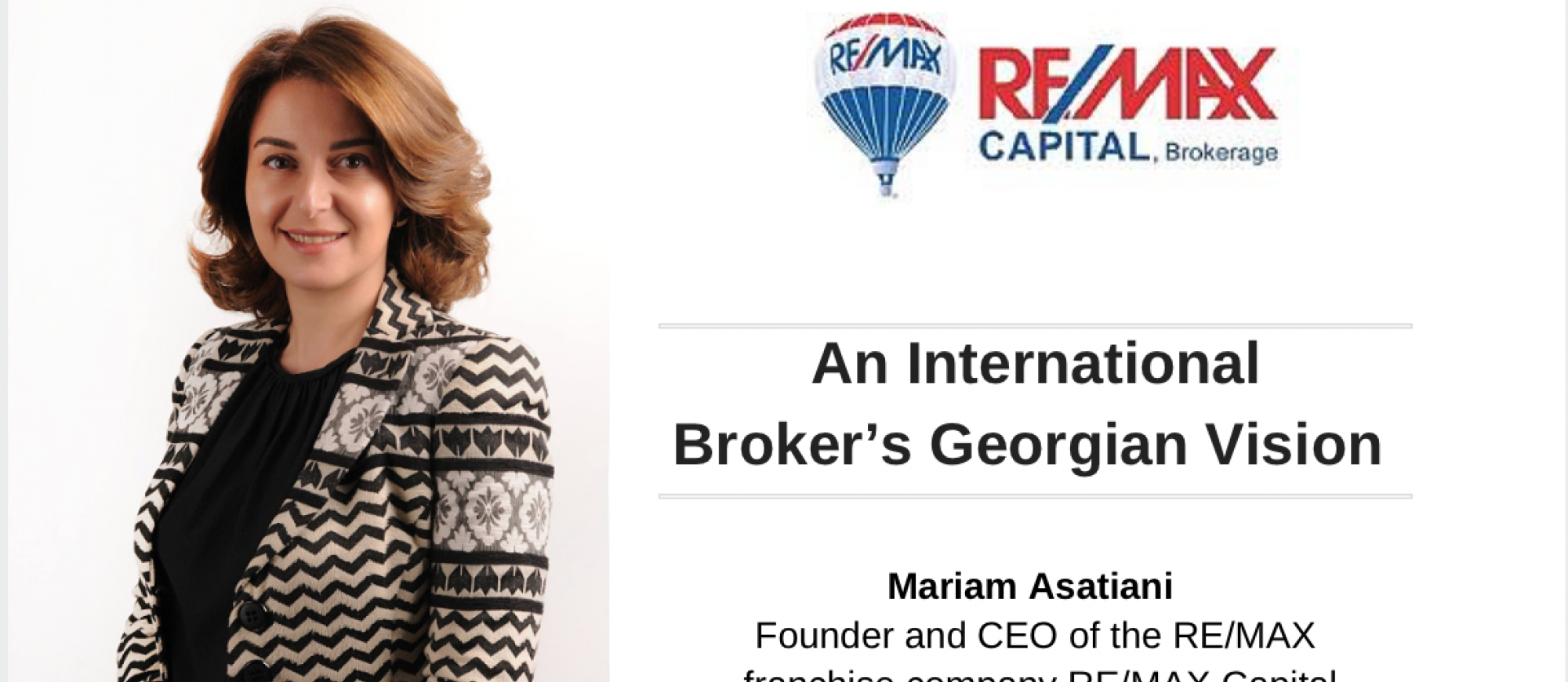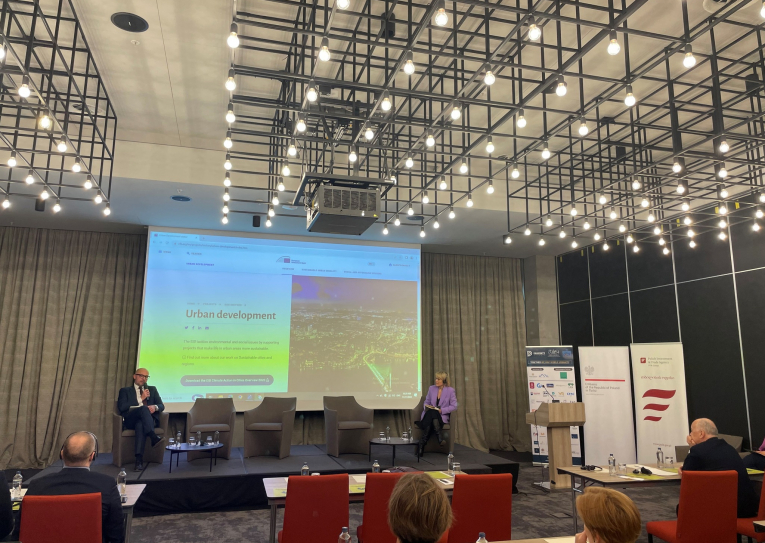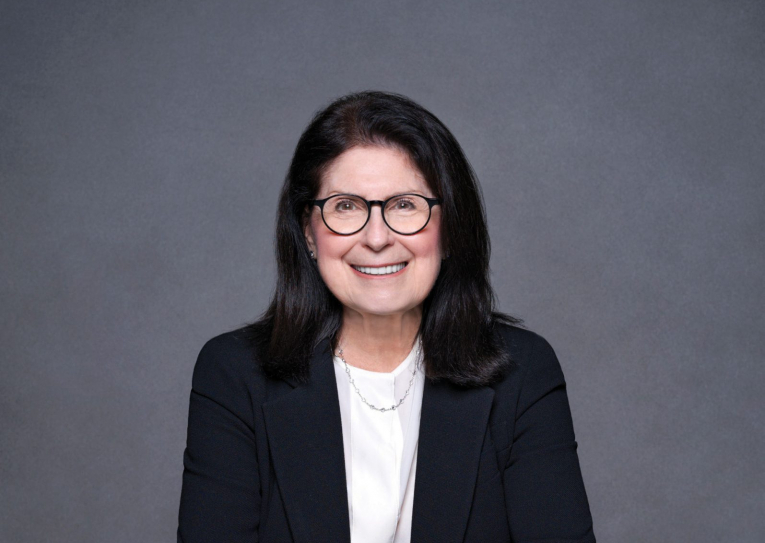By Kate Tabatadze
The global leader in real estate sales views the development trends and prospects of the Georgian market positively – Mariam Asatiani, Founder and CEO of the RE/MAX franchise company RE/MAX Capital, tells Property Georgia about the novelties and the challenges that exist in the sector today.
Briefly introduce your company – when was it founded, what is the scope of its services, and what are its main advantages?
RE/MAX is the world leader on the real estate brokerage market with its broad network, numerous offices and top statistics in terms of successful transactions. The company was founded in Denver 40 years ago, and within a short space of time it expanded into Europe, Africa and Asia. Today it is represented in over 100 countries with up to 7000 independent offices and more than 100 000 agents.
It is not only the geographic coverage, but also the top service, the multitude of satisfied clients and the strong marketing support that makes RE/MAX the most recognizable real estate brand internationally, and now also in Georgia, where it has been operating franchise companies since 2014. RE/MAX Capital is a franchise company that conducts services on the Georgian market in accordance with the RE/MAX standards. We are the only international brand in Georgia that offers a full spectrum of brokerage services – through agents trained in accordance with international standards – in buying, selling and renting both commercial and residential real estate, as well as in consulting. Our database is integrated within RE/MAX’s international database, thereby providing our clients with an unprecedented opportunity to advertise real estate on the international market.
How attractive is the Georgian real estate sector for investors today, and which areas would you highlight?
Tourism and agriculture are the main areas of interest for investors, but I would also highlight the interest in land plots designated for construction of residential and office complexes. Land plots suitable for development and buildings suitable for hotels constitute the only segment where demand is exceeding supply. Generally speaking, investment potential has gone up, and Georgia is once again establishing itself within the investors’ sphere of interest. However, it has to be said that our market – probably due to its small size and past experiences of instability – is characterized by quick reactions to certain political and economic messages, more so than this is the case in other countries. During the last couple of years, there have been several instances of sharp rise and fall in demand from investors in various sectors. Interest has been growing recently, though in order to stabilize demand and develop certain sectors, it will be necessary to ensure long-term consequential policies.
Have consumers changed their behavior over the past few years while choosing residential properties? What are the main criteria employed by them today?
In recent times, the residential real estate market has undergone interesting changes. We had our first development sector boom in 2007, when the number of construction projects that were started during the 2000s reached its peak. This year there was another period of boom, as the second stage of construction reached its peak. These stages differed from each other in terms of the specifics of the products on offer, as well as the pricing system – in the late 2000s, there was very little variety in terms of the ongoing construction projects, and the works were concentrated in the city centre, while today, the geographic scope has broadened, and the products on offer can be sub-divided into various segments: in the city centre, we mainly have premium-class products with green frame or fully fitted out, shared spaces and exterior that have been finished with expensive materials, and a flat management system; in the suburbs, we mainly have economy-class products with black or white frame, smaller spaces, as well as economy-class finish and exterior.
The customer’s buying behavior and criteria for choosing the product have changed accordingly. Today we come across clients who are purchasing flats for the second or third time, to either upgrade their own living conditions, or for investment purposes. These experiences have made the customers more demanding, which in turn offers new challenges to developers in a competitive environment.
In which areas of the city are there most transactions and highest demand in terms of new residential construction?
Recently, we have observed a tendency of getting away from the city centre. There is demand for premium-class products in the districts of Mtatsminda, Krtsanisi, Kaklebi and Dighomi. Demand has also increased for land plots designated for construction in the suburbs of Tbilisi. Percentagewise, however, the highest demand is in Saburtalo. Development of residential micro-districts on the city’s peripheries is also trendy right now. We believe that in the light of a temporary moratorium being imposed on the issuance of coefficients in the city centre, construction activity in the suburbs will increase further still.
What kind of changes have there been in terms of pricing and demand for residential, office and commercial real estate over the past few years?
Residential property prices have changed parallel to the product’s segmentation process and with the changes in the type of product on offer. The price scale has increased – prices during the boom years of the 2000s ranged from $900 to $1200 per m2, while today, they range between $450 and $2500. Percentagewise, the share of economy-class property construction is higher. Therefore, this segment has a larger share in establishing the average price, and it sometimes creates a misleading picture with regards to the average pricing. Some believe that prices for first-time flat buyers have dropped, which is not the case. In reality, the product has become segmented, and there is a greater variety in pricing. If we look at the prices for similar products in terms of the segment and the location over the past 10 years, we will see that they have increased substantially overall, and have remained roughly the same compared to last year.
As for the commercial and office spaces, demand has been consistently high. Construction of new business centres reinforced the tendency of moving offices from residential properties to the business centres. There is a lot of potential in this regard, and we believe that demand for office space in business centres will remain high for a while. Similar to the residential market, here we may also observe a segmentation process and the establishment of A, B and C-class office centres.
Demand for commercial space has also increased, especially for rentable commercial property as a means of investment.
What are the challenges faced by the sector, and what are its development opportunities?
The local real estate market is still quite young. There are lots of people employed in this sector (according to the statistics department, 33 000 individuals are officially working in this field, though many more unregistered middlemen are involved in reality). Nevertheless, brokerage is not popular in the country, and people’s attitude towards this profession in Georgia differs substantially from the attitude towards real estate agents on the developed markets. Unfortunately, it is often the case that both the consumer and the middleman have misconceptions about the needs and the specifics of brokerage services, as well as the mutual responsibilities of the client and the real estate agent. Both sides have their rights violated in numerous different ways. At the root of these problems is the lack of legislative regulation of the sector, as well as a lack of professional education. I believe that under such circumstances, international real estate companies operating on the Georgian market have a higher responsibility. Based on RE/MAX’s global experiences, we can say that even the leading economic powers have gone through this development stage. However, it is up to us to decide what mechanisms we will use to hasten the sector’s recovery process. It will be crucial to develop legislation that will regulate the sector, protect the interests of both the consumer and the realtor, determine the standards of service, as well as provide education, establish a training centre, and finally, licensing the brokers, which will protect the consumer from sub-standard service while giving real estate agents an incentive to educate and enhance themselves.
What would you wish to the newly created portal www.propertygeorgia.ge and what are your expectations?
Your new portal is excellent news for leading real estate companies such as us. At a time when the sector is facing so many challenges, the arrival of each new professional company on the market and the establishment of every new communications and information channel such as this portal is important. I hope that you will provide useful and much-needed information, and that you have interesting respondents, as well as an interested audience!





